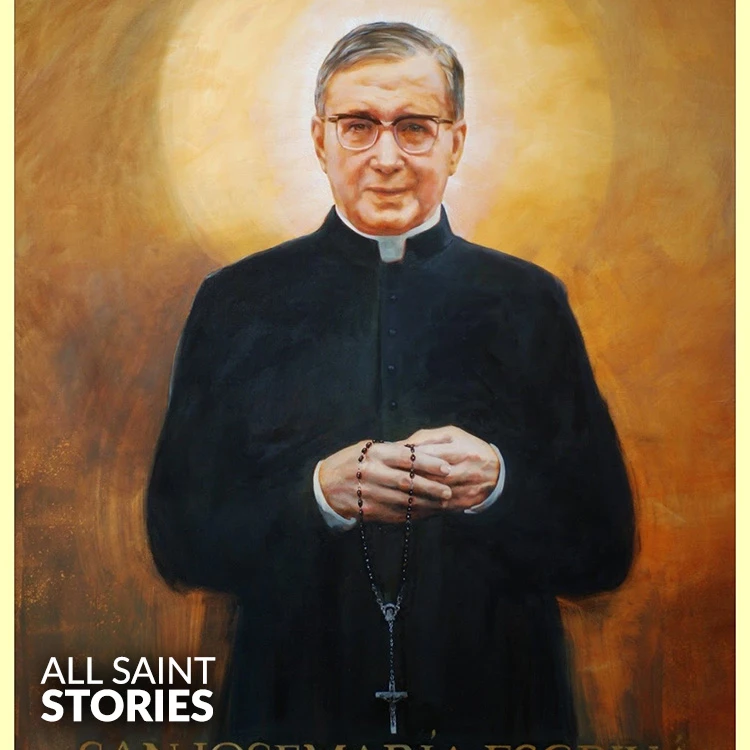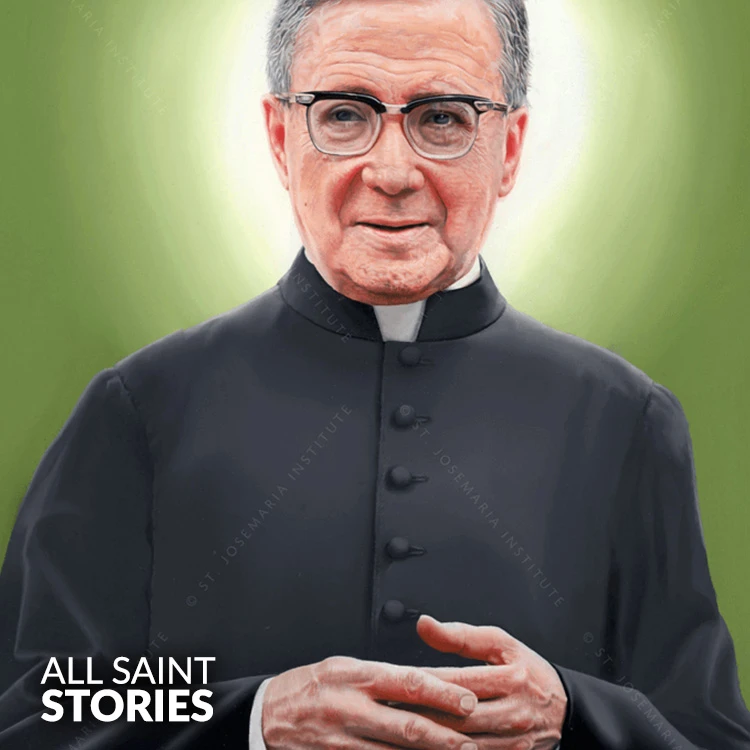O God, through the intercession of St. Josemaría, inspire us to sanctify our daily work and to find holiness in ordinary life. Help us to serve others with love and to live with integrity, joy, and faithfulness to Your will. Grant us the grace to imitate his love for the Church and devotion to Your Son, Jesus Christ. Amen.
ST. JOSEMARIA ESCRIVA
ST. JOSEMARIA ESCRIVA

St. Josemaría Escrivá was a Spanish priest and founder of Opus Dei, promoting holiness in everyday life. Born in 1902, he emphasized sanctifying daily work. Canonized in 2002, his feast day is celebrated on June 26.
St. Josemaría Escrivá de Balaguer was born on January 9, 1902, in Barbastro, Spain, into a devout Catholic family. His early life was marked by both religious formation and personal trials, including the financial hardship and death of several siblings. These experiences deepened his interior life and sense of divine calling.
He was ordained a priest on March 28, 1925, in Zaragoza. It was during this period of intense spiritual reflection and prayer that he received a divine inspiration that would shape the rest of his life. On October 2, 1928, while on retreat in Madrid, Fr. Josemaría saw the mission God had for him: to found Opus Dei (Latin for "Work of God"). The new institution aimed to spread the revolutionary message that all people are called to holiness — not just priests and religious, but lay men and women — and that daily life and work are paths to sanctity when lived in union with God.
Opus Dei sought to teach that holiness could be found in everyday occupations — in offices, hospitals, schools, farms, and homes. This message was deeply countercultural in an era when sanctity was often associated with religious life and withdrawal from the secular world. Escrivá preached that every honest work, done with love and offered to God, could sanctify both the individual and society.
In founding Opus Dei, St. Josemaría encountered significant challenges, including suspicion from ecclesiastical authorities, political instability in Spain during the Civil War, and the complexity of building a new kind of organization within the Church. Nonetheless, he persevered with humility and courage, always seeking to be obedient to the Holy See. He moved to Rome in 1946 to secure permanent approval for Opus Dei and to personally oversee its development as it expanded internationally.
He wrote extensively to articulate the spiritual principles behind Opus Dei. His best-known work, “The Way,” published in 1939, is a collection of 999 brief spiritual maxims that offer insight and practical guidance on living a Christian life in the world. Other notable writings include “Christ is Passing By,” “Friends of God,” and “Furrow.” His writings have been translated into dozens of languages and continue to inspire millions.
St. Josemaría was also known for his deep prayer life, intense devotion to the Eucharist, and love for the Church. He was approachable, humorous, and deeply compassionate. People from all walks of life sought his guidance, and his spiritual direction helped many discover their personal call to holiness in secular professions.
He died in Rome on June 26, 1975, from a sudden heart attack. At the time of his death, Opus Dei had spread across six continents, with thousands of members and collaborators.
The cause for his beatification began in 1981. Pope John Paul II beatified him in 1992 and canonized him on October 6, 2002, calling him “the saint of ordinary life.” His body is venerated at the Prelatic Church of Opus Dei in Rome, Our Lady of Peace, where many faithful come to pray for his intercession.
Today, St. Josemaría Escrivá’s message continues to resonate with Catholics seeking to integrate their faith into their family life, professional work, and civic responsibilities. His legacy is one of empowering the laity to realize that everyday life — when united with Christ — becomes a path to holiness and a means of transforming the world.
Video Not Found
The information on this website is compiled from various trusted sources. While we aim for accuracy, some details may be incomplete or contain discrepancies.
If you notice any errors or have additional information about this saint, please use the form on the left to share your suggestions. Your input helps us improve and maintain reliable content for everyone.
All submissions are reviewed carefully, and your personal details will remain confidential. Thank you for contributing to the accuracy and value of this resource.
Credits & Acknowledgments
- Anudina Visudhar (Malayalam) – Life of Saints for Everyday
by Msgr. Thomas Moothedan, M.A., D.D. - Saint Companions for Each Day
by A. J. M. Mausolfe & J. K. Mausolfe - US Catholic (Faith in Real Life) – Informational articles
- Wikipedia – General reference content and images
- Anastpaul.com – Saint images and reflections
- Pravachaka Sabdam (Malayalam) – Saint-related content and insights
We sincerely thank these authors and platforms for their valuable contributions. If we have unintentionally missed any attribution, please notify us, and we will make the correction promptly.
If you have any suggestion about ST. JOSEMARIA ESCRIVA
Your suggestion will help improve the information about this saint. Your details will not be disclosed anywhere.
© 2026 Copyright @ www.allsaintstories.com




 English
English
 Italian
Italian
 French
French
 Spanish
Spanish
 Malayalam
Malayalam
 Russian
Russian
 Korean
Korean
 Sinhala
Sinhala
 Japanese
Japanese
 Arabic
Arabic
 Portuguese
Portuguese
 Bantu
Bantu
 Greek
Greek
 German
German
 Dutch
Dutch
 Filipino
Filipino